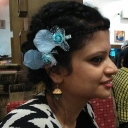
The refulgent yellow was playing tic-tac-toe with the blushing scarlet before the incandescent orange joined them. They were engaged in a merry game, their ebullience finding its presence in overshadowing the city’s otherwise colourful buildings, now completely submerged in their black shadow. Strands of clouds floated like soft fossils of memories, as the playful colours reeked a nostalgia which took her back to her past where she had worn the same yellow, blushing in the red of her gaye holud.
‘How things have changed,’ she thought. ‘She was mere fifteen when she got married to her husband.’
‘You can’t keep a beautiful young girl like this in your house,’ she had overheard her Jyathamoshai and Pishima convincing her parents. ‘She needs to get married.’
Her parents had acceded to their requests, which rather, seemed to sound like orders and had married her off to a groom who was earning well from a government job.
The scarlet hue dropped blotches of red on her senile face as she kept on staring at the sunset. What else could she do? Even in this busy city of Stockholm, she was perhaps all alone, immersed in her own memories with a tourist visa which bore her identity, a colour which marked her as an ‘Indian’ and an ‘accent’ of English which categorized her into the class of those Indian parents who have no knowledge of English. The roof of her daughter’s apartment was perhaps her only solace, like the thakur ghor of her nijer bari, back in Kolkata.
She has been vegetating there since the last four months, spending her weekdays all alone as her daughter left for her lab at seven in the morning, only to return at eight in the evening, perhaps six at the earliest. With her Swedish neighbours busy in their own world, Mira was nothing but a wandering ghost in the posh apartment where her daughter lived.
Cooking and cleaning. How long could this ablate her loneliness? How long could she fight against the smoke alarm which would restrict her from making begun pora or luchi? How long would the vacuum cleaner make her feel that she was not needed anymore?
‘I have to leave after six months,’ she would tell her daughter. ‘Don’t apply for extension.’
‘Where would you go, Ma?’ her daughter would goad. ‘Do I mean nothing to you? Do you want to be with those relatives back in Kolkata whose visits are only limited to the time right after your return to the city with your presents for them?’
Mira had stopped reproaching these days. She didn’t know the reason. Was it her slow realizations, a blooming wisdom or the soft petals of her one and only daughter, soaked with emotions?
‘Baba is no more, Ma. Who else do I have except for you?’ the words kept on reverberating in Mira’s ears. The resplendent red hues conjured upon her an era, long forgotten. She yenned for the curls of the red, who sang a lullaby as the jolly yellow started to fall asleep, crawling back into the corona of the sun. She kissed the sky with the palette of her fading red, just like the sindur which transpires the identity of a married woman.
Mira could see her own reflection, thirty years back, when her aunts had covered her with the lojjabostro, with the newlywed bride delving deep in her own blushes at the first touch of the sindur on her forehead. It became her best friend in all those moments when she missed her husband, when in his absence, this very red powder, with tinge of orange reminded everyone of the man behind her, of the man she belonged to and of the duties which had chained her in the sugar coated letters of the word, ‘ginnima’. It perhaps gave her an unexpected advantage over the single mother of her daughter’s best friend, who would rarely come to school, out of sheer ignorance towards the ‘modern Kolkata society’ where the character of a woman is still measured in the colours of a red powder. The veneer of the faraway buildings, bathed in a distant black emitted a greyish odour, which slowly started to make its presence in the sky.
The moments of the yellow, orange and red were finally over. The sky was denigrated by the approaching evening, blacker than the black gowns the Christians wear at their funerals. Mira, who still strove through the gastronomy, desperately trying to get used to the loaf over her ruti, was enchanted by this blackness and in the fallacy of her own customs.
‘Why would they make us, bidhobas wear white, when black has become the colour of our lives?’ Mira pondered. The white scared her, the saturnine evening was rather her friend and in her lassitude, she realized the futility of the white which mocked the lives of the widows like her. Black, made sense, perhaps a candour, an open acceptance of the life that was supposed to meet her feet. The throng of black and grey hues removed her scepticism towards a foreign culture that she had to slowly get used to. The matured red bade farewell, like a past, promising only to come in memories. And then, it was all black, as the sun set again for another day in the city of Stockholm.
About the Author







Comments